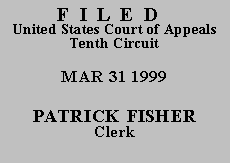

| UNITED STATES OF AMERICA, |
|
Before BRORBY, EBEL, and
LUCERO, Circuit Judges.
After examining the briefs and appellate record, this panel has determined
unanimously that oral argument would not materially assist the determination of
this appeal. See Fed. R. App. P. 34(a)(2); 10th Cir. R. 34.1.9(G). The case is
therefore ordered submitted without oral argument.
Appellant Lewis Theodore Wacker, a prisoner appearing pro se, appeals the district court's dismissal of his motion brought under 28 U.S.C. § 2255 and requests a certificate of appealability. We deny the request for a certificate of appealability and dismiss the appeal.
Mr. Wacker received a sentence of 123 months incarceration on conviction for one count of conspiracy to possess with intent to distribute approximately 2,000 pounds of marijuana, three counts of possession with intent to distribute marijuana, and one count of using a firearm during and in relation to a drug-trafficking crime. On appeal, we reversed the firearm conviction and remanded for a new trial in light of Bailey v. United States, 516 U.S. 137 (1995). See United States v. Wacker, 72 F.3d 1453, 1480 (10th Cir. 1995). On remand, the government moved to dismiss the firearm count, and consequently, the court found a new trial unnecessary. The district court resentenced Mr. Wacker to seventy-eight months incarceration, applying an enhancement under United States Sentencing Guidelines § 2D1.1(b)(1) for possession of a firearm during a drug trafficking offense. We affirmed the sentence on appeal. See United States v. Van Pelt, 1997 WL 738600 (10th Cir. Dec. 1, 1997) (unpublished).
Mr. Wacker brought this § 2255 motion challenging the federal government's ability to criminalize drug trafficking and, inter alia, challenging the constitutional validity of the Comprehensive Crime Control Act of 1984. A lengthy supplementary thirty-two-page memorandum in support also contained: (1) rambling and verbose allegations that the United States Code is not authorized by, nor is it a law of, Congress; (2) an unintelligible jurisdictional argument based on his contention his privately-owned business is not situated in a territory of the United States of America, but the "jurisdiction of the State Republics"; and (3) a warning to the court on the consequences of "usurpation, treason, and tyranny" in not following his version of jurisdictional law.
The district court issued a thorough and detailed memorandum decision rejecting Mr. Wacker's argument the federal government lacks authority to criminalize drug trafficking and upholding the constitutionality of Comprehensive Crime Control Act and Sentencing Reform Acts of 1984. As to Mr. Wacker's other arguments, the district court rejected them stating:
The balance of the defendant's motion is a mishmash of legal citations and highly selective quotations from a number of sources spun into a stream of conscious amalgam in the vain attempt of finding some measure of relief from his sentence. As none of the arguments advanced by the defendant have any merit, the court will not waste its limited resources attempting to systematically address each point raised.
Mr. Wacker filed a motion to reconsider raising the same and new arguments. The district court denied the old arguments for the reasons previously stated, and rejected the new arguments finding Mr. Wacker "identified no reason that they could not have been presented in his first volley of voluminous pleadings."
Having lost on the issues raised before the district court, Mr. Wacker proceeds on appeal with a variety of new and fanciful, but relatively unintelligible and ludicrous arguments. They consist of questions with incomprehensible discussion on whether: (1) the "United States" and "United States of America" are synonymous terms; (2) "provisions relating to gold and silver coin[s]" have been amended or repealed; (3) Congress is authorized to establish a national bank; and (4) an Internal Revenue Service district office exists in nearly every state. Among other things, he makes conclusory allegations that: (1) the district court did not have personal jurisdiction over him, which is also somehow connected with the notion his "real and proper name is spelled in proper English"; (2) the district court lacked "authority to apply any Law"; and (3) prosecutors made threats to potential defense witnesses causing fear and suppressing their testimony.
As a pro se litigant, Mr. Wacker's pleadings must be construed liberally and held to a less stringent standard than formal pleadings drafted by lawyers. See Drake v. City of Fort Collins, 927 F.2d 1156, 1159 (10th Cir. 1991) (citing Haines v. Kerner, 404 U.S. 519, 520-21 (1972)). Despite the liberal construction afforded pro se pleadings, we generally will not consider issues raised for the first time on appeal, Walker v. Mather (In re Walker), 959 F.2d 894, 896 (10th Cir. 1992), or conclusory and unsupported allegations, Wise v. Bravo, 666 F.2d 1328, 1332 (10th Cir. 1981). We also will not construct arguments or theories for Mr. Wacker absent any coherent discussion of those issues. Drake, 927 at 1159.
Even construing Mr. Wacker's allegations on appeal liberally, we find they totally lack merit. They either contain conclusory allegations or incomprehensible arguments, do not show a denial of any constitutional right, or are so unrelated to the charge on which he was convicted as to verge on being either purposefully comedic or malicious with the intent to harass or waste the limited resources of the court. For these and other reasons not warranting further discussion, we deny Mr. Wacker's request for a certificate of appealability and dismiss his appeal.
Entered by the Court:
WADE BRORBY
United States Circuit Judge
*. This order and judgment is not binding precedent except under the doctrines of law of the case, res judicata and collateral estoppel. The court generally disfavors the citation of orders and judgments; nevertheless, an order and judgment may be cited under the terms and conditions of 10th Cir. R. 36.3.